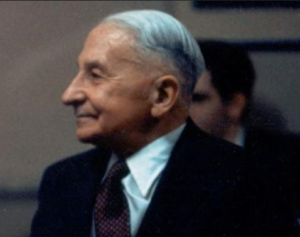The Misesian (TM): The economics behind gift giving and charity have long been a neglected topic among researchers and economists. What prompted you to launch your own investigation into the topic?Jörg Guido Hülsmann (JGH): The economic literature on gifts is actually quite massive, but it’s true that these writings don’t make it into standard micro- and macroeconomics. My initial interest was sparked by Benedict XVI’s 2009 encyclical letter Caritas in veritate. The pope wondered how the scope of gratuitous goods could be increased in the human economy, and he called on all people of good will to deal with this issue in thought and action. I put a doctoral student to work on this subject in 2011 and she successfully defended her French-language dissertation four
Read More »Articles by Jörg Guido Hülsmann
Die Ökonomie der Unentgeltlichkeit
March 10, 2024Die Ökonomie der Unentgeltlichkeit
8. März 2024 – Interview mit Jörg Guido Hülsmann
The Misesian (TM): Die wirtschaftlichen Mechanismen des Schenkens und der Wohltätigkeit waren lange Zeit ein vernachlässigtes Thema in der volkswirtschaftlichen Lehre und Forschung. Was hat Ihre Untersuchung zu diesem Thema veranlasst?
Jörg Guido Hülsmann (JGH): Die ökonomische Literatur zu Geschenken ist ziemlich umfangreich. Es stimmt jedoch, dass diese Schriften keinen Platz in der Standard-Mikro- und Makroökonomie gefunden haben. Mein Interesse für dieses Thema wurde zunächst durch die 2009 erschienene Enzyklika Caritas in Veritate von Papst Benedikt XVI. geweckt. Der Papst warf die Frage auf, wie dem „Prinzip der Unentgeltlichkeit“ in der menschlichen
The Epistemological Case for Capitalism
July 12, 2022[This article is excerpted from chapter 21 of Mises: The Last Knight of Liberalism.]
In the early 1950s, Mises’s NYU seminar dealt increasingly with epistemological questions. As he said to Ludwig Lachmann, he felt that the analysis of epistemological problems would be the number one task in the social sciences in the coming years.1 It was the topic of his last two monographs: Theory and History (1957) and The Ultimate Foundation of Economic Science (1962).
The subject had been prominent in his thoughts and reflections since the publication of “Sociology and History” (1929) and “Conception and Understanding” (1930). It was one of the two areas in which he felt contemporary economics was most deficient (the other one being the theory of economic calculation). In
Secession and the Production of Defense
July 27, 2021[unable to retrieve full-text content][unable to retrieve full-text content][Chapter 11 of The Myth of National Defense: Essays on the Theory and History of Security Production, edited by Hans-Hermann Hoppe (Auburn, Ala.: Mises Institute, 2003), pp. 369–413.]
Few people object to the private production of shoes or rock concerts.
Why the New Economics Just Boils Down to Printing More Money
June 18, 2020[Editor’s Note: this article is adapted from a 2003 essay in the Quarterly Journal of Austrian Economics entitled “New Keynesian Monetary Views: A Comment.” As economists abandon theory in favor of makeshift plans to flood the economy with stimulus, Hülsmann here provides some helpful reminders of the fundamental problems behind the current economic consensus on money.]
The essential fallacy of John Maynard Keynes and his early disciples was to cultivate the monetary equivalent of alchemy. They believed that paper money was a suitable means to alleviate the fundamental economic problem of scarcity. The printing press was, at any rate, under certain plausible conditions of duress, a substitute for hard work, savings, and cutting prices (Hazlitt 1959, 1960).
The



